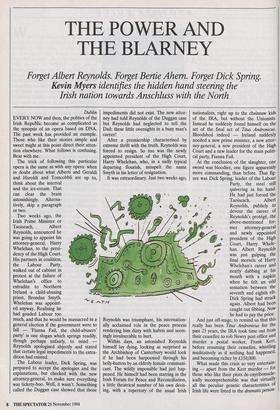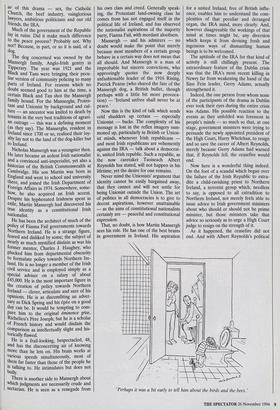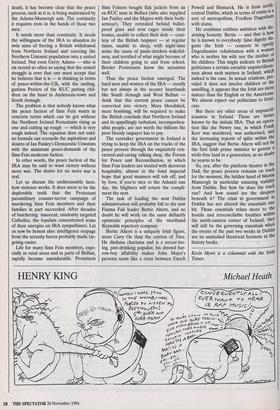THE POWER AND THE BLARNEY
Forget Albert Reynolds. Forget Bertie Ahern. Forget Dick Spring.
Kevin Myers identifies the hidden hand steering the
Irish nation towards Anschluss with the North
Dublin EVERY NOW and then, the politics of the Irish Republic become as complicated as the synopsis of an opera based on DNA. The past week has provided an example. Those who like their stories simple and sweet might at this point direct their atten- tion elsewhere. What follows is confusing. Bear with me.
Two weeks ago, the Irish Prime Minister or The Labour leader, Dick Spring, was prepared to accept the apologies and the explanations, but checked with the new attorney-general, to make sure everything was tickety-boo. Well, it wasn't. Something called the Duggan case showed that those impediments did not exist. The new attor- ney had told Reynolds of the Duggan case but Reynolds had neglected to tell the Dail: these little oversights in a busy man's career!
After a premiership characterised by extreme thrift with the truth, Reynolds was forced to resign. So too was the newly appointed president of the High Court, Harry Whelehan, who, in a sadly typical departing flourish, misspelt the name Smyth in his letter of resignation.
It was extraordinary. Just two weeks ago, Reynolds was triumphant, his internation- ally acclaimed role in the peace process rendering him dizzy with hubris and seem- ingly invulnerable to hurt.
Within days, an astonished Reynolds himself lay dying, looking as surprised as the Archbishop of Canterbury would look if he had been harpooned through his belly-button by an elderly female communi- cant. The wildly impossible had just hap- pened. He himself had been starring in the Irish Forum for Peace and Reconciliation, a little theatrical number of his own devis- ing, with a repertory of the usual Irish
nationalists, right up to the chainsaw kids of the IRA, but without the Unionists. Instead he suddenly found himself on the set of the final act of Titus Andronicus. Bloodshed indeed — Ireland suddenly needed a new prime minister, a new attor- ney-general, a new president of the High Court and a new leader for the main politi- cal party, Fianna Fail.
At the conclusion of the slaughter, one sword was bloodier, one figure apparently more commanding, than before. That fig- ure was Dick Spring, leader of the Labour Party, the steel still quivering in his hand. He had just forced the
Taoiseach, Albert Reynolds, publicly to devour the career of Reynolds's protégé, the above-mentioned for- mer attorney-general and newly appointed president of the High Court, Harry Whele- han. Albert Reynolds was just gulping the final morsels of Harry Whelehan's career and neatly dabbing at his mouth with a napkin when he felt an odd sensation between the seventh and eighth rib. Dick Spring had struck again. Albert had been caught out fibbing. Now he had to pay the price.
And just off-stage, to remind us that this really has been Titus Andronicus for the past 25 years, the IRA took time out from their ceasefire to rob Newry post office and murder a postal worker, Frank Kerr, before resuming their ceasefire, whistling meditatively as if nothing had happened, and becoming richer by £150,000. What made this crisis so very entertain- ing — apart from the Kerr murder — for those who like their plots de-oxyribonucle- ically incomprehensible was that virtually all the peculiar genetic characteristics Of Irish life were listed in the dramatis person- ae of this drama — sex, the Catholic Church, the beef industry, vainglorious lawyers, ambitious politicians and our old friends, the IRA.
Much of the government of the Republic lay m rums. Did it make much difference to the peace process? Probably not. Why not? Because, in part, or so it is said, of a dog.
The dog concerned was owned by the Mansergh family, Anglo-lrish gentry in Tipperary. The year was 1921 and the Black and Tans were bringing their pecu- liar version of community policing to many Parts of Ireland. For reasons which no doubt seemed good to him at the time, a certain Black and Tan shot the Mansergh family hound. For the Manserghs, Protes- tant and Unionist by background and cul- ture — an ancestor was knifed to death by tenants in the very best traditions of agrari- an outrage — this was a defining moment (as they say). The Manserghs, resident in Ireland since 1700 or so, realised their loy- alty lay not to the land of the dog-killer but to Ireland.
Nicholas Mansergh was a youngster then. He later became an ardent Irish nationalist and a convinced anti-imperialist, yet also a historian of the British Commonwealth at Cambridge. His son Martin was born in England and went to school and university there, and joined the Irish Department of Foreign Affairs in 1974. Somewhere, some- how, he also acquired an Irish accent. Despite his hyphenated Irishness spent in exile, Martin Mansergh had discovered his true identity as a constitutional Irish nationalist.
He has been the architect of much of the Policy of Fianna Fail governments towards Northern Ireland. He is a strange figure, feared and disliked by some; the subject of nearly as much mystified disdain as was his former mentor, Charles J. Haughey, who plucked him from departmental obscurity to formulate policy towards Northern Ire- land. He is no longer a member of the Irish civil service and is employed simply as a special adviser on a salary of about £45,000. He is the most important figure in the creation of policy towards Northern Ireland — clever, articulate and sure of his opinions. He is as discomfiting an adver- sary as Dick Spring and his epee on a good day can be. It would be tempting to com- pare him to the original eminence grise, Richelieu's Pere Joseph; but he is a scholar of French history and would disdain the comparison as intellectually slight and his- torically flawed.
He is a frail-looking, bespectacled, 48, and has the disconcerting air of knowing more than he lets on. His brain works at various speeds simultaneously, most of them far faster than those of the people he is talking to. He intimidates but does not bully.
There is another side to Mansergh about which judgments are necessarily crude and sectarian. He is seen as a renegade from his own class and creed. Generally speak- ing, the Protestant land-owning class he comes from has not engaged itself in the political life of Ireland, and has observed the nationalist aspirations of the majority party, Fianna Fail, with mordant aloofness. Mansergh — and his admirers — no doubt would make the point that merely because most members of a certain group behave in a certain way does not mean that all should. And Mansergh is a man of improbable but sincere convictions, who approvingly quotes the now deeply unfashionable leader of the 1916 Rising, Patrick Pearse (who shared the fate of the Mansergh dog, a British bullet, though perhaps with a little bit more provoca- tion) — 'Ireland unfree shall never be at peace.' Now this is the kind of talk which sends cold shudders up certain — especially Unionist — backs. The complexity of his message is lost in the reflex imagery sum- moned up, particularly in British or Union- ist minds, whenever Irish republicans and most Irish republicans are vehemently against the IRA — talk about a democrat- ic, united Irish republic. Such a republic, as the now caretaker Taoiseach Albert Reynolds has stated, will not happen in his lifetime; yet the desire for one remains.
Never mind the Unionists' argument that identity cannot be easily bargained away, that they cannot and will not settle for being Unionist outside the Union. The art of politics in all democracies is to give to decent aspirations, however unattainable — as the aims of constitutional nationalists certainly are — peaceful and constitutional expression.
That, no doubt, is how Martin Mansergh sees his role. He has one of the best brains in government in Ireland. His aspiration for a united Ireland, free of British influ- ence, enables him to understand the com- plexities of that peculiar and deranged organ, the IRA mind, more clearly. And, however disagreeable the workings of that mind at times might be, any diversion which keeps it from devising fresh and ingenious ways of dismantling human beings is to be welcomed.
The aptitude of the IRA for that kind of activity is still chillingly present. The extraordinary feature of the Dublin crisis was that the IRA's most recent killing in Newry far from weakening the hand of the Sinn Fein leader, Gerry Adams, actually strengthened it.
Indeed, the one person from whom none of the participants of the drama in Dublin ever took their eyes during the entire crisis was Adams. His possible reaction to the events as they unfolded was foremost in people's minds — so much so that, at one stage, government ministers were trying to persuade the newly appointed president of the High Court, Harry Whelehan, to resign and so save the career of Albert Reynolds, merely because Gerry Adams had warned that, if Reynolds fell, the ceasefire would end.
Now here is a wonderful thing indeed. On the foot of a scandal which began over the failure of the Irish Republic to extra- dite a child-ravishing priest to Northern Ireland, a terrorist group which, needless to say, is opposed to all extradition to Northern Ireland, not merely feels able to issue advice to Irish government ministers about who should or should not be prime minister, but those ministers take that advice so seriously as to urge a High Court judge to resign on the strength of it.
As it happened, the ceasefire did not end. And with Albert Reynolds's political 'Perhaps it was a bit early to tell him about the birds and the bees.' death, it has become clear that the peace process, such as it is, is being maintained by the Adams-Mansergh axis. The continuity it requires rests in the hands of those two men.
It needs more than continuity. It needs the willingness of the IRA to abandon its twin aims of forcing a British withdrawal from Northern Ireland and coercing the Northern Unionist population into a united Ireland. Not even Gerry Adams — who is on record so often as saying that the armed struggle is over that one must accept that he believes that it is — is thinking in terms of peace-within-the-UK, with the smiling, gunless Peelers of the RUC patting chil- dren on the head in Andersons-town and South Armagh.
The problem is that nobody knows what the peace faction of Sinn Fein wants in concrete terms which can be got without the Northern Ireland Protestants rising as one and cutting up rough — which is very rough indeed. The equation does not exist: no formula can reconcile the aspirations and desires of Ian Paisley's Democratic Unionists with the minimum peace-demands of the Sinn Fein moderate faction.
In other words, the peace faction of the IRA may be said to want victory without more war. The desire for no more war is real.
Let us discuss the undiscussable here: how violence works. It does seem to be the deplorable truth that the Protestant paramilitary counter-terror campaign of murdering Sinn Fein members and their families in part succeeded. After decades of butchering innocent, randomly targeted Catholics, the loyalists concentrated some of their energies on IRA sympathisers. Let us now be honest also: intelligence seepage from the security forces probably made tar- geting easier.
Life for many Sinn Fein members, espe- cially in rural areas and in parts of Belfast, rapidly became unendurable. Prominent Sinn Feiners bought flak jackets from an ex-RUC man in Belfast (who also supplied Ian Paisley and the Majors with their body- armour). They retreated behind bullet- proof glass and iron cages inside their homes, unable to collect their dole — cour- tesy of the British taxpayer — at regular times, unable to sleep, with night-time noise the cause of panic-stricken wakeful- ness, and terrified of what might become of their children going to and from school. Border Protestants know the sensation well.
Thus the peace faction emerged. The hard men and women of the IRA — mostly but not always in the securer heartlands like South Armagh and West Belfast think that this current peace cannot be converted into victory. More bloodshed, more bombing, will be required to make the British conclude that Northern Ireland and its appallingly turbulent, incomprehen- sible people, are not worth the billions the poor bloody taxpayer has to pay.
The caretaker government in Ireland is trying to keep the IRA on the tracks of the peace process through the exquisitely con- cerned-and-caring talking shop, the Forum for Peace and Reconciliation, in which Sinn Fein leaders are treated with decorous hospitality, almost in the fond imperial hope that good manners will rub off, and by Jove, if you're nice to the Ashanti one day, the blighters will return the compli- ment the next.
The task of leading the next Dublin administration will probably fall to the new Fianna Fail leader Bertie Ahern, and no doubt he will work on the same defiantly optimistic principles of the moribund Reynolds repertory company.
Bertie Ahern is a uniquely Irish figure, more Carry On than the carrion of Titus. He disdains charisma and is a soccer-lov- ing, pint-drinking populist; his shrewd bar- row-boy affability makes John Major's persona seem like a cross between Enoch
Powell and Bismarck. He is from north- central Dublin, which in terms of status is a sort of metropolitan, Fordless Dagenham with slums. He combines ruthless ambition with dis- arming honesty. Bertie — and that is how he is known to everybody: false dignity dis- gusts the Irish — consorts in openly Dagenhamite cohabitation with a woman
who is neither his wife nor the mother of his children. This might indicate to British politicians a certain enviable unpunctilious-
ness about such matters in Ireland, which
indeed is the case. In sexual relations, pro- vided it does not involve children or the unwilling, it appears that the Irish are more mature than the English or the Americans. We almost expect our politicians to forni- cate. But there are other areas of unpunctil- iousness in Ireland. These are better known by the initials IRA. That an opera-
tion like the Newry one, in which Frank Kerr was murdered, was authorised, and the increasing reports of splits within the IRA, suggest that Bertie Ahern will not be the first Irish prime minister to govern a strife-free land in a generation, as no doubt he yearns to be. So, yea, after the platform theatre in the Dail, the peace process remains on track for the moment, the hidden hand of Martin Mansergh in particular ensuring stability from Dublin. But how far does the track run? And how sound are the sleepers beneath it? The crisis in government in Dublin has not altered the essentials one
bit. Those essentials relate more to the
hostile and irreconcilable loyalties within the north-eastern corner of Ireland; they will still be the governing essentials when the events of the past two weeks in Dublin are an unstudied theatrical footnote in the history books.
Kevin Myers is a columnist with the Irish Times.












































































 Previous page
Previous page